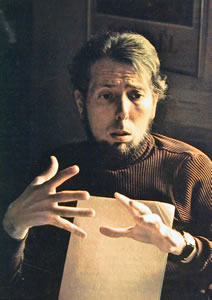“Good experiments, like good drama, embody verities.” (1973)
“The creative claim of social psychology lies in its capacity to reconstruct varied types of social experience in an experimental format, to clarify and make visible the operation of obscure social forces so that they may be explored in terms of the language of cause and effect.” (1977)
"Only in action can you fully realize the forces operative in social behavior. That is why I am an experimentalist." (1974)
 [From a description of his methodology in his doctoral dissertation, a conformity experiment using an adaptation of the Asch group-pressure procedure] "With tape recordings it is easy to create synthetic groups. Tapes do not have to be paid by the hour and they are always available." (1961)
[From a description of his methodology in his doctoral dissertation, a conformity experiment using an adaptation of the Asch group-pressure procedure] "With tape recordings it is easy to create synthetic groups. Tapes do not have to be paid by the hour and they are always available." (1961)
"With numbing regularity good people were seen to knuckle under the demands of authority and perform actions that were callous and severe. Men who are in everyday life responsible and decent were seduced by the trappings of authority, by the control of their perceptions, and by the uncritical acceptance of the experimenter's definition of the situation, into performing harsh acts. .A substantial proportion of people do what they are told to do, irrespective of the content of the act and without limitations of conscience, so long as they perceive that the command comes from a legitimate authority." (1965)
[From Milgram's reply to a critic who claimed that most subjects in the obedience experiments discovered that the shocks were not real but continued anyway because they didn't want to ruin the experiment] "Orne's suggestion that the subjects only feigned sweating, trembling, and stuttering to please the experimenter is pathetically detached from reality, equivalent to the statement that hemophiliacs bleed to keep their physicians busy." (1972)
[From Milgram's reply to Baumrind's ethical critique of the obedience experiments] "I started with the belief that every person who came to the laboratory was free to accept or to reject the dictates of authority. This view sustains a conception of human dignity insofar as it sees in each man a capacity for choosing his own behavior. And as it turned out, many subjects did, indeed, choose to reject the experimenter's commands, providing a powerful affirmation of human ideals." (1964)
[Defending the obedience experiments in a reply to a critical editorial in the St. Louis Post-Dispatch] “Relatively few subjects experienced greater tension than a nail-biting patron at a good Hitchcock thriller.” (1963)
[Milgram’s comment on the findings in his study of mental maps that New Yorkers were much more likely to recognize parts of Manhattan than sections of their own boroughs] “Areas of Queens have often been accused of being nondescript, and taxi drivers are reported to fear entering Queens lest they never find their way out. And with good reason, when even the people who live in Queens are lost in their home borough compared with the sense of place they experience in Manhattan!” (1977)
[From Milgram’s speech at a conference commemorating the urban tragedy of the murder of Kitty Genovese, noting why, in his opinion, her murder had received so much continuing attention]
“The case touched on a fundamental issue of the human condition, our primordial nightmare. If we need help, will those around us stand around and let us be destroyed or will they come to our aid? Are those other creatures there to help us sustain our life and values or are we individual flecks of dust just floating around in a vacuum?” (1984)
[From a note to his departmental chairman at CUNY, notifying him that he would have to miss an upcoming committee meeting because it conflicted with Rosh Hashanah] “Sorry for the inconvenience, but this particular holiday was scheduled 5738 years ago, and therefore has my prior commitment. I’d appreciate rescheduling…” (1977)
“Each individual possesses a conscience which to a greater or lesser degree serves to restrain the unimpeded flow of impulses destructive to others. But when he merges his person into an organizational structure, a new creature replaces autonomous man, unhindered by the limitations of individual morality, freed of humane inhibition, mindful only of the sanctions of authority.” (1974)
[To highlight the revelatory power of his findings of high obedience rates, Milgram would describe the experiment to various groups and ask them to predict the outcome. Invariably, they would vastly underestimate the level of obedience actually found by Milgram. One such group consisted of 40 Yale psychiatrists. Here is how Milgram reported what he found in a letter to a colleague.] “The psychiatrists—although they expressed great certainty in the accuracy of their predictions—were wrong by a factor of 500. Indeed, I have little doubt that a group of charwomen would do as well.” (1962)
"When an individual wishes to stand in opposition to authority, he does best to find support for his position from others in his group. The mutual support provided by men for each other is the strongest bulwark we have against the excesses of authority." (1974)
"It may be that we are puppets-puppets controlled by the strings of society. But at least we are puppets with perception, with awareness. And perhaps our awareness is the first step to our liberation." (1974)
"The social psychology of this century reveals a major lesson: often it is not so much the kind of person a man is as the kind of situation in which he finds himself that determines how he will act." (1974)
www.psychspace.com心理学空间网

